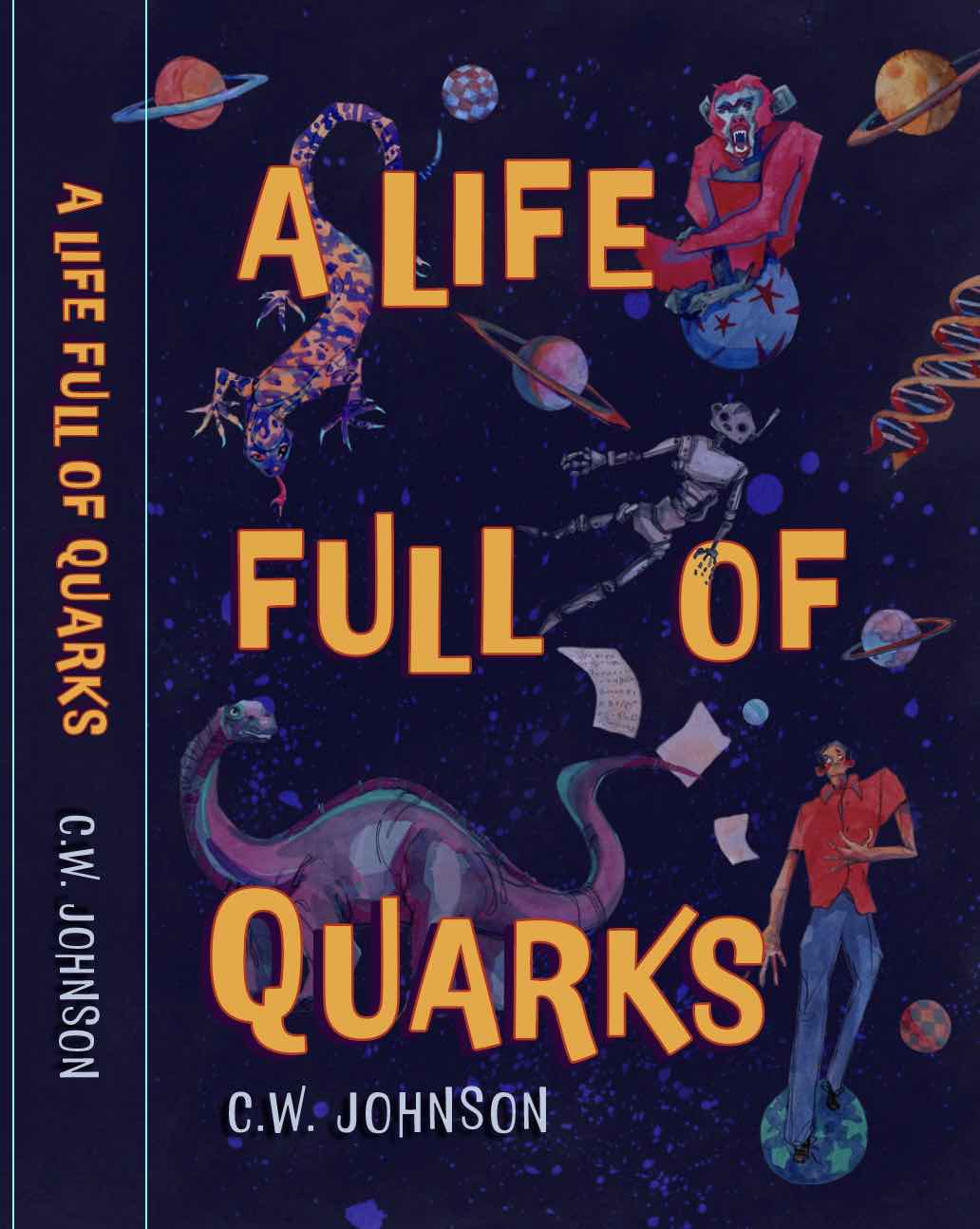A Review of Reviews
I recently launched efforts in advertising, and soon will write about that part of my journey. But readers, especially readers who are not relatives or friends or students or co-workers, need a reason to read my novel. (Although I have been cautious about advertising to students—a reader who feels obligated to read is not a good reader—I found students were curious about a wacky novel their physics professor wrote.) A nearly universal ingredient in enticing readers: reviews.
Most publishing platforms, not only Amazon but Barnes & Noble, Apple Books, etc., make it easy for buyers to post reviews. There are also reviewing platforms. The New York Times has a Sunday Book Review section, which I read semi-religiously. Most books appearing in the NYT Sunday Book Review are by Big Name Authors or from an Established Publishing House. I doubt they have ever reviewed a self-published novel.
Yet thousands of people self-publish each year, almost none of them named Stephen King or George R. R. Martin, and those people hunger for reviews. You may have spotted the economic opportunity here.
There are quite a few pay-to-play review services: that is, you pay to get someone to read your novel and write a review. The obvious question pops up: aren’t you just paying someone to write a positive review?
Here’s how the game is played: the review platforms do not promise a positive review. When you pay for a review, however, you control whether or not the review is made public. This allows all parties involved to assuage their conscience, as the reviewer can turn in a negative review, and the author has the power to block the review.
I know of no statistics as to the ratio of positive to negative reviews on these websites. My own guess is that the reviewers are told, Don’t lie, but do try to find the good in a book as often as you can.
I won’t lie either. I paid for reviews on four sites. One of them, reedsy discovery, had a minimal fee ($50). The reviews are crowdsourced (and as far as I can tell, the reviewers not compensated, at least not directly), and if no one chooses to review your book, your $50 will get refunded… or you will be asked if you would like to keep dangling your book out there a little longer.
I also paid for reviews on BookLife, a subsidiary of Publishers Weekly, on Kirkus Reviews, and the Self-Publishing Review. You can look up the costs yourself, but not surprisingly, the best known (Kirkus) is the priciest, while the least (SPR) the cheapest.
Lucky for me, the (paid for) reviews came in very positive. You can find links to them on other blog posts. Most thrilling to me was that I got a starred review on Kirkus; this is one of the bigger platforms, and only about 10% (or less) of reviews are starred.
The reviews, all a few hundred words long, consist mostly of boiling down the plot (although Kirkus stated, “It’s impossible to accurately convey the off-the-wall lunacy comprising the first act,” which itself is a complement), with relatively light but nonetheless accurate analysis. There is also a slight criticism in each; in my opinion, however, the criticisms were all fair (BookLife: “daunting length and lack of narrative momentum,” Kirkus: “Some might find the humor morbid, and maybe even cruel,” while Self-Publishing Review only cites “occasional grammatical lapses”).
Each reviewer came up with different favorites, which pleased me, but I noticed the structure was surprisingly similar, so much so that I wondered if there were standard instructions issued:
- Be honestly positive when you can.
- Include both positive/negative remarks to give the review some balance.
- Give the reader an overview of the plot; highlight X elements; give a sense of the author’s style and strategy.
- Come up with a precis suitable for pasting on the book cover.
For the latter, Kirkus wrote “Heartbreaking and hilarious,” and BookLife enthused “Thrillingly inventive novel of growing up the son of a mad scientist.” SPR conveniently provided an entire summary paragraph suitable for posting on Amazon: “A mind-expanding novel, this book sets a beautiful example of how to move through life with endless wonder, while also landing gut-shot moments of philosophical revelation that make for a meaningful read. This novel grips readers from the very first page with its inventiveness, intelligence, and lyricism, resulting in a masterful work of absurdist fiction that is remarkably grounded in authentic emotion and real science."
While the reviews focused on the overall plot, I did come away thinking the reviewers had truly read and understood the book. Kirkus: “Somehow, seemingly disparate story elements … all weave together seamlessly in an unforced and pleasing fashion.” BookLife: “Despite the novel’s buoyant humor and pervasive wildness…real human feeling is Johnson’s throughline..” Who wouldn’t be pleased with reviews like that?
Is it worth it? For both the author and the review site? For me, because the reviews called out elements I was proud of, I ‘felt seen.’ Importantly, these reviews give me something positive to advertise. The fact that both reviews were enthusiastic, which I do not believe is manufactured, and I got the rare starred review on Kirkus, also buoyed me. I worked for well over a decade on this novel, often feeling despondent, and I’m not immune to wanting praise.
What about for the reviewer and review platform? Even paying for a review, it could barely cover the time for the reviewer to read the novel and write a review. It struck me that this is a great side-gig for English majors, people who love to read, can read fast, and can quickly analyze and encapsulate a narrative. (I wasn’t an English major, but I loved to read from an early age and also taught myself these tricks.)
Obviously, the reviewers will speed-read the books—something many English majors, and me, are good at—even to the point of skimming. And indeed, when I search for posts reviewing these review sites, I frequently came across complaints that reviews at site XYZ contained incorrect facts about the book and misrepresented the material.
Again, I was lucky; I did not feel that way. My reviews conveyed with relative accuracy the contents and the sentiments of the novel. (I will say that the SPR review teetered on inaccuracies; for example, a particle accelerator is stated as being in the protagonist’s basement, when in fact it is in a disused sewer, a fact that another reviewer got correct. But the basic set-up was correctly stated.)
For the platform, these reviews are loss-leaders. Almost immediately after posting the reviews, I was deluged with offers for further “opportunities” in advertising, coaching, and so on. I was approached by another review site, BookTrib, which offered not only reviews, but TV interviews (starting at a mere $1200) and their “Amazon Bestseller Program” for an eye-watering $5,500. Kirkus has also contacted me, also with fairly expensive promotional packages. SPR offers a range of more affordable programs.
(Weirdly, I also get those offers of paid-for TV interviews for my scientific articles.)
I doubt those high-end programs work for very many books. While for the sake of my own ego and advertising fodder I was willing to plunk down a few hundred dollars, going an order of magnitude higher in expenditures does not seem wise to me.
In the end, I’m glad I went with Kirkus—it simply has the most oomph, if you can get a good review out. Because of that, I’m actually less interested in the SPR review. I guess there’s still some part of me that feels that ‘self-published’ carries a demerit.
The overall issue of how much to spend on my novel—my hobby—is a tricky one, a topic I’ll take up again soon when I write about my initial forays into advertising.

